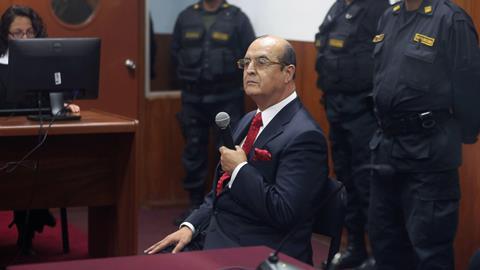Riveting account of international spy drama
The Case of the Welched Reward: Spies, the FBI and pursuit of Peru’s Most Infamous Fugitive
Mark A. Cymrot
$29.95, Universal Publishers
★★★★✩
Mark Cymrot’s book is a cross between a John Grisham thriller and counsel’s skeleton argument. It provides a riveting insight into the US legal system, and the international legal battle between the Peru government following the flight of former national security chief Vladimiro Montesinos (pictured above) and a Venezuelan spy (Jose Guevara) who claimed a $5m reward from the government. Issues of sovereign/state immunity are explored in some detail. Cymrot also provides an insight into the procedural machinations of the US court system.
Cymrot exposes the endemic corruption in Peru perpetrated by Montesinos: ‘Typical videos show Montesinos bribing congressmen for votes, offering a Supreme Court justice an extra $10,000 monthly salary, medical care and personal security. In one, Montesinos pulls wads of bills from a plastic bag and puts them into a fine leather briefcase, which he throws in as a gift to the pleased bribetaker. Judges and politicians also get non-cash bribes, such as cars and houses. One judge negotiated jobs for his wife and son, as well as payment for his daughter’s education in the United States. When Montesinos arranged a first class air fare for her, the judge expressed his surprise, which led Montesinos to exclaim: “First class? Of course, I wouldn’t send her coach”.’
Cymrot took over Peru’s defence in the case (Jose Guevara v Republic of Peru) after the US Court of Appeals had rebuked Peru for ‘welching’ or revoking on its promise to pay Guevara a reward for information leading to the arrest of Montesinos.
The author takes us from Lima to a courtroom in Miami followed by a voyage aboard a yacht named The Karisma and then to the inner sanctum of the decision-makers in the Peruvian government from whom Cymrot took instructions. He raised the not unreasonable question before the US courts: why should a Venezuelan citizen be allowed to sue the Peruvian government in a US court? Cymrot argued that a relatively minor contact with the US should not suffice to found jurisdiction.
The US Court of Appeals analysed the sovereign immunity doctrine, finding (rather oddly) that the offer of a reward by a sovereign government was a commercial activity. Sovereign immunity is only waived when a government engages in commercial activity. However the court went on to rule that for sovereign immunity to be waived the commercial activity must have a nexus to the US. The court held that the acts committed by Peru in the US in connection with commercial activities elsewhere were inadequate to justify US jurisdiction.
Cymrot leads BakerHostetler’s international arbitration and litigation practice based in Washington DC. He previously acted in one the world’s biggest silver disputes. His previous book – Squeezing Silver: Peru’s Trial Against Bunker Hunt – recounts that litigation and is also recommended.
Stephen D. Sutton is principal at Suttons Solicitors & International Lawyers, London
































No comments yet